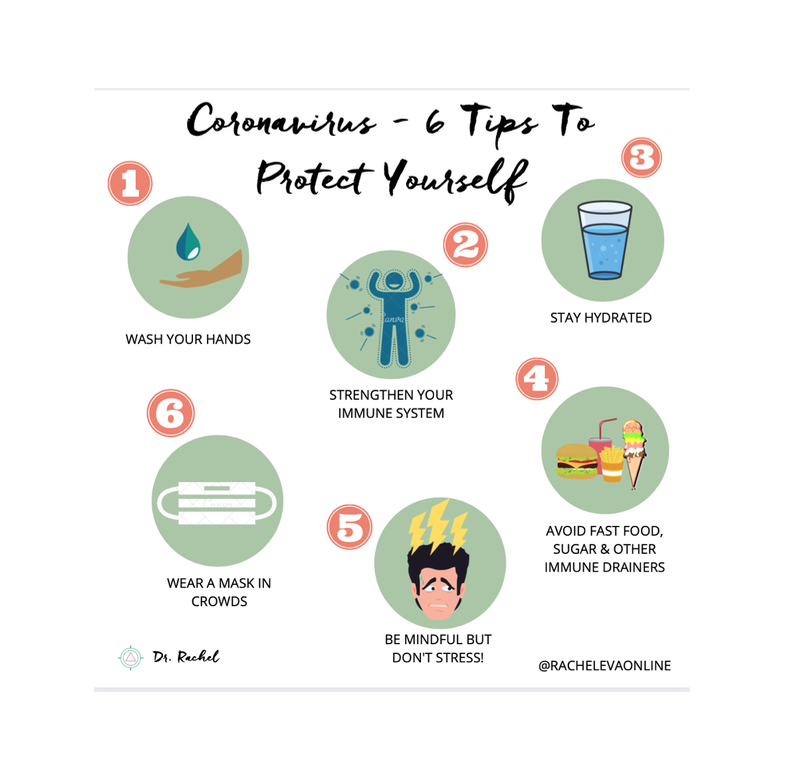Coronavirus – 6 Tips to Protecting Yourself
Coronavirus & Immunity – How To Protect Yourself
The Coronavirus… is this a serious virus? Absolutely! Should you be cautious and take precautions to remain safe, definitely! There is a lot of misinformation going around and I want to help you by providing information that is directly from The Center for Disease Control and The World Health Organization to ensure that you have the facts. There are also some effective preventative measures that you can take to additionally protect yourself and your family.
What we know about the Coronavirus –
- ‘CDC is responding to an outbreak of respiratory disease caused by a novel (new) coronavirus that was first detected in China and which has now been detected in almost 70 locations internationally, including in the United States. The virus has been named “SARS-CoV-2” and the disease it causes has been named “coronavirus disease 2019” (abbreviated “COVID-19”). Imported cases of COVID-19 in travelers have been detected in the U.S.’. – The Center for Disease Control (CDC)
How is it spread?
- Person-to-person
- Contact with infected surfaces or objects
*Read more HERE
What this means is that it is absolutely important to take mindful precautions and also, that those precautions can reduce risks. I will go into this more later and give you the top 6 ways to protect yourself.
How deadly is it???
Though the Coronavirus can lead to death in some cases and it has, the majority of strong, healthy adults are able to fight it off and experience a severe flu at most. Those with compromised or fragile immune systems such as those with another serious illness or disease, those who are elderly and those who are immune compromised are more prone to contracting the virus and well as experiencing more severe symptoms and a higher risk.
‘Both MERS-CoV and SARS-CoV have been known to cause severe illness in people. The complete clinical picture with regard to COVID-19 is not fully understood. Reported illnesses have ranged from mild to severe, including illness resulting in death. While information so far suggests that most COVID-19 illness is mild, study out of China suggests serious illness occurs in 16% of cases. Older people and people with certain underlying health conditions like heart disease, lung disease and diabetes, for example, seem to be at greater risk of serious illness.’ – The CDC
Let’s take a deeper look at how deadly and dangerous this virus is in comparison to other epidemics and infectious viruses and illnesses so that you can get a better sense of the situation as a whole and to what level you or your loved ones may be at risk –
As of early March, the coronavirus outbreak had infected more than 90,000 people and killed more than 3,000 people globally, the majority of whom live in China, where the illness was first detected in December. More than 100 people in the United States have been diagnosed, including at least nine people who have died. By comparison, influenza — known as the common flu — has infected as many as 45 million Americans since October and killed as many as 46,000. Both the coronavirus and influenza are respiratory illnesses. Both have similar symptoms. Both are contagious. Both can be deadly according to estimates from the Centers for Disease Control and Prevention.
If you want to see more statistics on this issue but delivered in a fun, less stress inducing way, one of my favorite comedic educators, John Oliver shared all about the Coronavirus on last week’s episode. You can watch it HERE
So, What Do We Do?
Now that we have covered details about the virus itself, let’s talk solutions!
Each one of us is able to boost our immune system to its optimal capacity, each person’s optimal capacity is different, but no matter where your immune function lays (low or high) you can support it in being its best and most effective. Having your immune system operating at the most optimal level is an incredibly important aspect of protecting yourself from the Coronavirus in addition to taking other critical preventative measures.
Here are my top 6 tips for protecting yourself against the Coronavirus. I have then provided even more details as to how you can protect yourself from both contracting the Coronavirus as well as better positioning yourself for a positive outcome if you do contract it:
- BE SAFE – WASH YOUR HANDS, WEAR A MASK & GLOVES & PRACTICE SOCIAL DISTANCING
Since Coronavirus is spread not only person-to-person but also through surfaces and objects, be sure to both practice social distancing (6-foot rule), wear protective gear such as a mask and gloves as well as wash your hands immediately after touching something. Avoid touching anything else before washing your hands, especially your face or even worse, rubbing your eyes or sticking your finger in your nose. You must wash your hands WITH SOAP for 20-30 seconds in order to get germs off.
- STAY HYDRATED
Our bodies are up to 60% water! Most Americans are operating at low levels of dehydration. When we are dehydrated the body is not able to flush out germs, viruses and bacteria as easily as when it is properly hydrated. This means you should be drinking a minimum of ½ your body weight in ounces of pure filtered water each day (and a maximum of your full body weight in ounces – be sure to take electrolytes if you are drinking your full weight in ounces).
- STRENGTHEN YOUR IMMUNE SYSTEM
This might be the single most important thing you can do to protect yourself! The top immune system drainers are; mental emotional and physical stress, not enough sleep, processed foods, toxins and chemicals, allergens, sugar, caffeine, alcohol, dehydration, overworking and not resting.
Here are a few specific things additional that you can do to increase your immune function in addition to limiting or avoiding the disrupters I mentioned above:
- Taking Supplements such as L-lysine, Vitamin D, Colostrum, Chaga Mushrooms, Ashwagandha (to decrease impact of stress on the body), Vitamin C, B Vitamins, Zinc, Echinacea, Turmeric (to decrease internal inflammation which can lead to decreased immune function), Oregano Oil and Lavender Oil. You can also take supplements that have many of these ingredients and target immune support and function such as Immunity Master
- Ginger, garlic and manuka honey all have antibacterial and antiviral properties
- Avoid antibiotics whenever possible (sometimes they are necessary, but they are often over used. Also, antibiotics cannot help with any virus!!
- Sleep for 8 hours per night
- Make sure to schedule a day of rest and recuperation each week! Relax and have fun!
- Process and release negative emotions. Try finding a safe loving person to talk to or write in a journal
- Practice mindfulness and meditation, it has been scientifically proven to reduce stress!!
- Stay hydrated
- Give yourself permission to do less and also to say no when you need to
- AVOID IMMUNE DEPLETING FOODS
You may have heard the saying ‘Food is medicine’, and I agree with this wholeheartedly. I would also add to that that FOOD CAN ALSO BE YOUR ILLNESS. The wrong foods can make you sick and most definitely deplete your immune system. Processed foods filled with chemicals and preservatives, fast food, chemically treated foods, refined sugar, animal products treated with antibiotics and hormones, excess high glycemic index carbohydrates and dairy products put un-necessary pressure on your immune system. Wouldn’t you rather have the little invisible soldiers that make up your immune system battle to conquer viral or bacterial intruders versus to battle to process the junk in your food?
- WEAR PROTECTION (MORE ON MASKS & GLOVES)
So many people have been rushing out to buy masks that they are sold out in many locations. The CDC WAS saying the following about wearing masks and respirators in the prevention of Coronavirus:
‘CDC does not recommend the routine use of respirators outside of workplace settings (in the community). Most often, spread of respiratory viruses from person-to-person happens among close contacts (within 6 feet). CDC recommends everyday preventive actions to prevent the spread of respiratory viruses, such as avoiding people who are sick, avoiding touching your eyes or nose, and covering your cough or sneeze with a tissue. People who are sick should stay home and not go into crowded public places or visit people in hospitals’.
However, late March they shifted this position and released the following statement:
‘We now know from recent studies that a significant portion of individuals with coronavirus lack symptoms (“asymptomatic”) and that even those who eventually develop symptoms (“pre-symptomatic”) can transmit the virus to others before showing symptoms. This means that the virus can spread between people interacting in close proximity—for example, speaking, coughing, or sneezing—even if those people are not exhibiting symptoms. In light of this new evidence, CDC recommends wearing cloth face coverings in public settings where other social distancing measures are difficult to maintain (e.g., grocery stores and pharmacies) especially in areas of significant community-based transmission.’ To read the full report click HERE
While a mask may not be helpful in large open spaces such as the grocery store or mall if you are staying at least 6-feet away from EVERYONE, however gloves certainly are since any surface you touch may be infected. Yet if you are in close proximity, within 6 feet of others who may be ill, a mask can be helpful as ONE of the ways to protect yourself. When it comes to protective gear, after reading this, determine what you feel is best for you, for myself and my family’s health I personally will be wearing a mask and gloves if I must go out. However, staying HOME is the best preventative step you can take for your health and the health of others.
We don’t want to hoard masks and limit the amount available to healthcare providers but we do need to be protected. Here is a link to instructions as to how to make your own mask at home – CLICK HERE TO READ
If you are a healthcare professional who may be treating patients infected with the Coronavirus this image shows the recommended protective gear by the CDC –
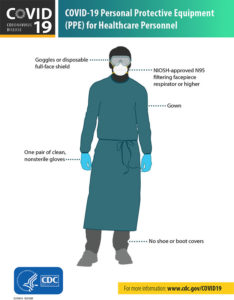
To read the details of protective gear for healthcare practitioners click HERE
https://www.cdc.gov/coronavirus/2019-ncov/hcp/respirator-use-faq.html
In regards to influenza viral transmission they had previously released a guide for effective use which included the following, ‘A surgical mask or fit-tested respirator should be worn by healthcare personnel who are within 6 feet of a suspected or laboratory-confirmed influenza patient’ and further described their use in non-health care settings as, ‘Adults can shed influenza virus 1 day before symptoms appear and up to approximately 5 to 7 days after onset of illness; thus, the selective use of masks (e.g., in proximity to a known symptomatic person) may not effectively limit transmission in the community. Young children, immunocompromised persons of any age, and critically ill patients with influenza can shed influenza viruses in the respiratory tract for prolonged periods. Moreover, because no single intervention can provide complete protection against influenza virus transmission, emphasis should be placed on multiple strategies’. The full guide can be read HERE
https://www.cdc.gov/flu/professionals/infectioncontrol/maskguidance.htm
I am not fearing the virus, but I am taking precautions! That means that anytime you are out and about be mindful and safe, but STAY HOME as much as possible. There are wonderful grocery delivery services through Instacart & Amazon Fresh, also direct delivery from CSA’s or farms such as Farm Fresh To You
- RELAX, DON’T STRESS!
Since stress is at the root of over 85% of all illness and disease, you can make yourself HIGHLY susceptible by worrying about this! Stress and anxiety break down the immune system and increases your chances of picking up a virus when exposed to one. So, take a deep breath and try to approach the whole Coronavirus issue from a responsible and preventative way while also being VERY intentional not to get on the negative-thought-hamster wheel of worry and despair – it definitely will not help and in fact, it can hurt.
For those who are highly susceptible to the Coronavirus (elderly, immune compromised or those with other underlying health conditions) limiting exposure means staying home and self-isolating when possible. If you who still have questions or are having a hard time moving past worry, let’s burst a few more myths about the Coronavirus –
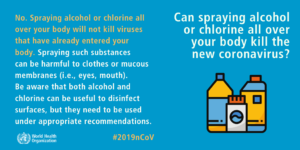
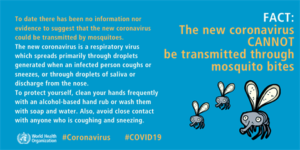
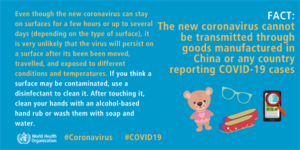
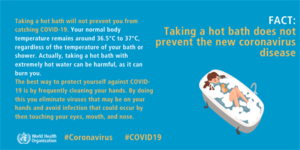
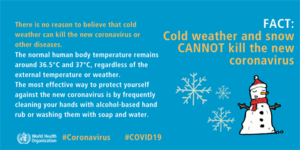
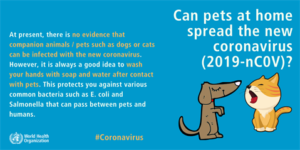
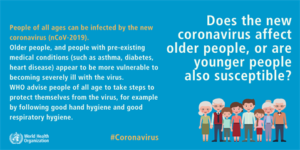
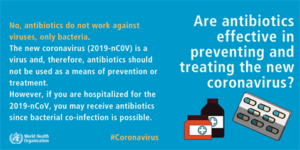
Images provided by The World Health Organization
May you be healthy, and may you take action to create your own health!
In Wellness,
Dr. Rachel

